Events and Activities
New book publications analyse digital transformation of financial system
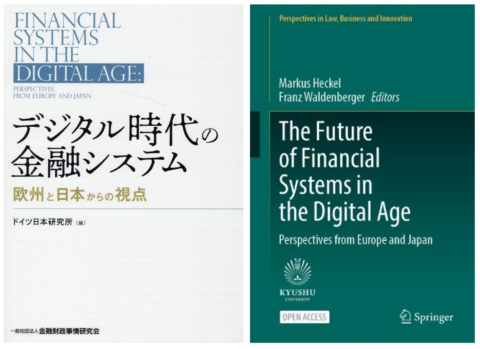
The increasing capacity of digital networks and computing power, together with the resulting connectivity and availability of “big data”, are impacting financial systems worldwide. They transform the structure and performance of financial markets and the business models of banks and other financial service providers. The new open access book The Future of Financial Systems in the Digital Age: Perspectives from Europe and Japan, edited by DIJ director Franz Waldenberger and principal researcher Markus Heckel, brings together leading scholars, policymakers, and regulators from Japan and Europe to analyse the digital transformation of the financial system. The authors study the impact of digitalization on the financial system, including transaction costs, digital and blockchain-based currency systems, algorithmic trading, the use of cashless payments, the challenges of regulatory oversight, and the transformation of banking business models. The book and its individual chapters can be downloaded for free here. A Japanese version of the book has been published as デジタル時代の金融システム―欧州と日本からの視点 by the Kinzai Institute for Financial Affairs.
Article co-authored by Markus Heckel investigates the complexity of monetary policy
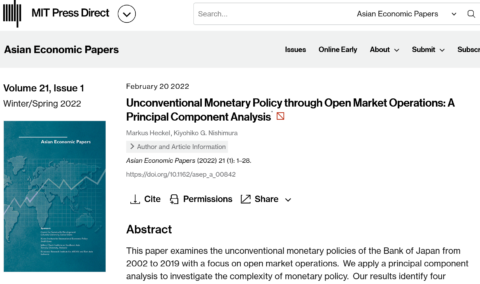
A new article co-authored by DIJ economist Markus Heckel and Kiyohiko G. Nishimura (GRIPS) examines the unconventional monetary policies of the Bank of Japan from 2002 to 2019 with a focus on open market operations. “Unconventional Monetary Policy through Open Market Operations: A Principal Component Analysis” (Asian Economic Papers, 21 (1), pp. 1–28) identifies four principal components that explain the variance of measures taken by the Bank of Japan and its operations of various facilities: asset purchase measures including Japanese Government Bonds (JGBs), Exchange-Traded Funds (ETFs), Japanese Real Estate Investment Trusts (J-REITs), and three different liquidity supply measures. Complexity differs substantially among different governorships of Fukui, Shirakawa (most complex), and Kuroda. The article is an outcome of Markus’ research project Economic Discourses of Monetary Policy – The Case of the Bank of Japan.
Open access article by Harald Kümmerle studies data practices in Japan
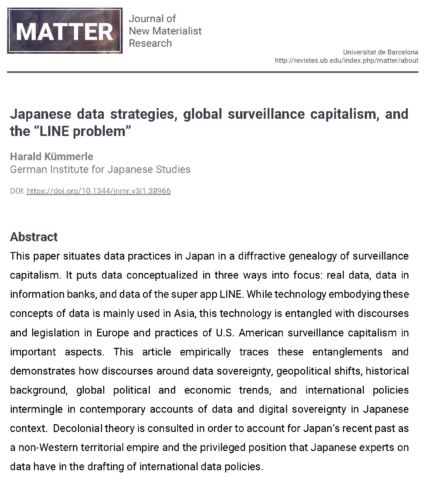 A new, open access article by DIJ senior research fellow Harald Kümmerle studies how data practices in Japan are linked to global surveillance capitalism. “Japanese data strategies, global surveillance capitalism, and the ‘LINE problem'”, published in the special issue on prospects for a new materialist informatics of Matter. Journal of New Materialist Research (Vol. 3, No.1, pp. 134-160), focuses on data conceptualized in three ways: real data, data in information banks, and data of the super app LINE. While technology embodying these concepts of data is mainly used in Asia, this technology is entangled with discourses and legislation in Europe and practices of U.S. American surveillance capitalism. The article demonstrates how discourses around data sovereignty, geopolitical shifts, historical background, global political and economic trends, and international policies intermingle in contemporary accounts of data and digital sovereignty in Japan. It is an outcome of Harald’s research project The discourse on the digital transformation in Japan: an analysis based on the concept of data.
A new, open access article by DIJ senior research fellow Harald Kümmerle studies how data practices in Japan are linked to global surveillance capitalism. “Japanese data strategies, global surveillance capitalism, and the ‘LINE problem'”, published in the special issue on prospects for a new materialist informatics of Matter. Journal of New Materialist Research (Vol. 3, No.1, pp. 134-160), focuses on data conceptualized in three ways: real data, data in information banks, and data of the super app LINE. While technology embodying these concepts of data is mainly used in Asia, this technology is entangled with discourses and legislation in Europe and practices of U.S. American surveillance capitalism. The article demonstrates how discourses around data sovereignty, geopolitical shifts, historical background, global political and economic trends, and international policies intermingle in contemporary accounts of data and digital sovereignty in Japan. It is an outcome of Harald’s research project The discourse on the digital transformation in Japan: an analysis based on the concept of data.
Nora Kottmann studies family practices of highly mobile, multi-local families
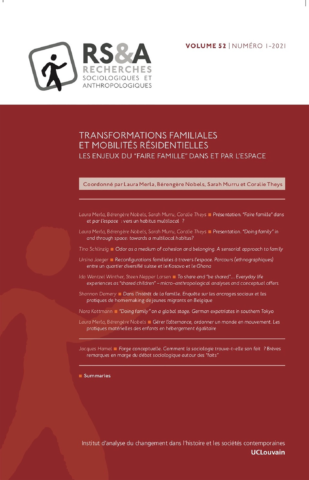
A new, open access article by DIJ principal researcher Nora Kottmann explores the relationship between “doing family”, mobilities, and space through a focus on expatriate families. “‘Doing family’ on a global stage. German expatriates in southern Tokyo” (Recherches sociologiques et anthropologiques, 52-1, 2021) draws on long term ethnographic fieldwork, including a variety of qualitative methods like interviews, conversations, and auto-ethnographic accounts. Utilizing the concepts of “doing family” the article asks: how and where do these highly mobile individuals do family? The analysis shows that approaches to doing family as well as the ensuing practices are diverse and dependent on various factors. It also reveals the emergence of key practices, including “displays” of family, that are highly structured by gender. Overall, the findings show the need for place-, space- and context-sensitive analyses even among a group of highly mobile families. This article is an outcome of Nora’s research project Relationships in motion: Doing belonging on a global stage.
Open access article by Sonja Ganseforth examines fish as cyborgs and commodities

Despite the central role of seafood in Japanese cuisine, domestic fisheries are facing a severe crisis. “Shifting Matter and Meanings in Japanese Seafood Assemblages: Fish as Functional Food Cyborgs and Emblematic Cultural Commodities” (Green Letters, online first) by DIJ principal researcher Sonja Ganseforth examines the changing cultural and socio-economic meanings and matter of fish in Japanese seafood assemblages. Sonja’s study is based on anthropological field research in fishing communities in southwestern Japan as well as on a sampling of cultural representations of fish. Her analysis finds a growing polarisation in the Japanese seafood sector: highly-processed food products and globally traded commodities inundate markets and dinner plates, while locally caught animals turn from basic foodstuff into folklorist stars of a vanishing rurality, a symbol of authenticity and national identity. The article is available open access and an outcome of Sonja’s research project Fishing communities between growth and demise.
Japan Jahrbuch: DIJ researchers and alumni look back at Japan 2021

The latest issue of the Japan Jahrbuch, the yearbook published by the German Association for Social Science Research on Japan, includes several articles (in German) written by current and former DIJ researchers on Japanese politics, economics, history, society, and law. DIJ director Franz Waldenberger explains lessons from Japan’s economic development while DIJ principal researcher Torsten Weber (with Anke Scherer, Bochum) analyses historical debates and historical consciousness. Articles by DIJ alumni include overviews of Japan’s domestic politics by Christian G. Winkler (Seinan Gakuin University) and of post-Abe foreign and security policies by Kai Schulze (Berlin), on a class action lawsuit against TEPCO and the government by Anna Wiemann (Munich) and Köksal Sahin, on images of family households in Japanese media by Stefanie Reitzig, and on Japan as a dual earner society by Annette Schad-Seifert (Dusseldorf). For more details please see the table of content. The book is available as softcover and e-book from the publisher here.
New open-access DIJ Miscellanea Comparing Comparisons
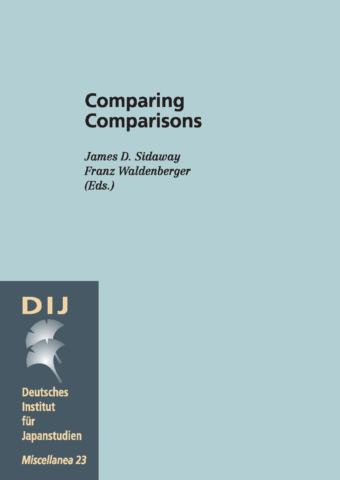
Comparing Comparisons, edited by James D. Sidaway and DIJ director Franz Waldenberger, is the latest volume published in our open-access DIJ Miscellanea series. It investigates which role comparisons play in different research fields, ultimately tackling the question of how and why we compare in the social sciences and humanities. The nine short essays collected in this volume reflect on aspects, methods, benefits, and possible pitfalls of comparisons from the perspectives of anthropology, economics, history, geography, Japanese Studies, and Southeast Asian Studies. It also tackles the problem of commodification and decolonization of comparisons. Contributors include DIJ principal researchers Isaac Gagné, Markus Heckel, Nora Kottmann and members of the DIJ’s research group on “Borders, Mobility and New Infrastructures” at the National University of Singapore. The essays were originally published as blog entries on the open edition platform Hypotheses between May 2020 and May 2021. More details and link to download the PDF here.
Winter issue of DIJ Newsletter published

We have just published the winter issue of our DIJ Newsletter featuring updates on our research, publications, and events, including Web-Forum sessions on Digital Transformation; new publications in our DIJ Monographs and Miscellanea series; introducing our new staff member Luise Kahlow; updates on our Bandō Collection; activities of our alumni; an Advent Book Gift Campaign; new videos on our DIJ YouTube channel and much more. We hope you will enjoy exploring this new edition of the DIJ Newsletter. If you haven’t done so yet, you can subscribe to receive it directly to your inbox. The full issue and subscription form are available here.




 Open Access
Open Access
